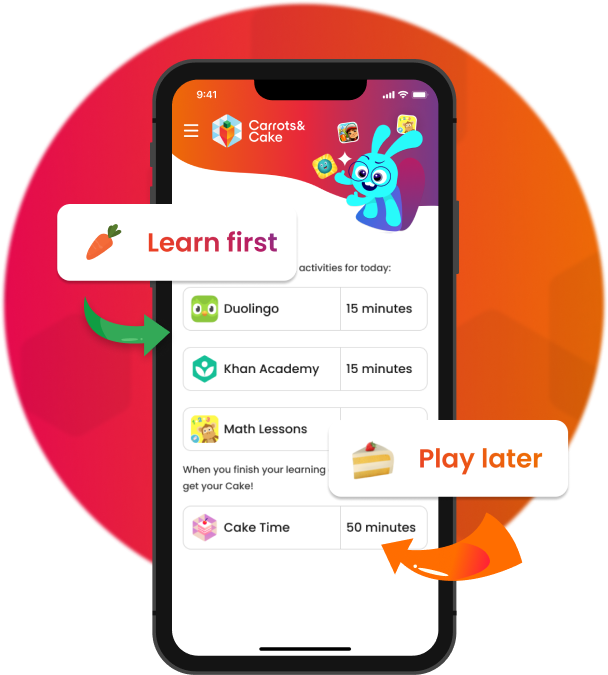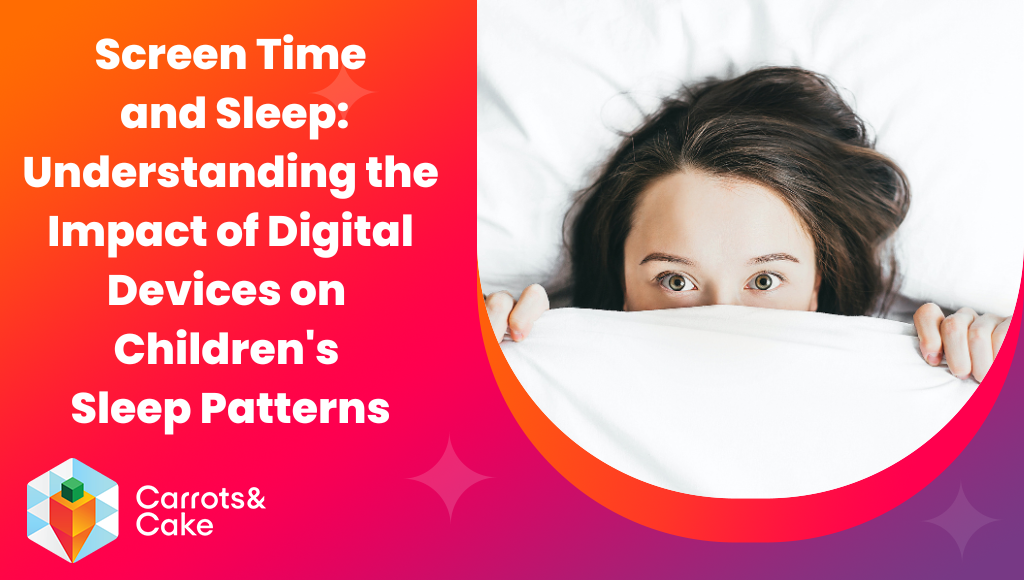


Parents must be cognizant of the consequences that prolonged use of digital devices can have on their children's sleep. Recent studies show a clear link between excessive exposure to blue light and poor quality sleep, as well as mental stimulation leading to disrupted bedtime routines. In this blog post we will explore how screen time affects your child’s sleeping patterns, offering practical advice for minimizing its negative impacts while still allowing them access to digital media in moderation. Join us as we discuss the relationship between screen time and sleep.
Screen time is the amount of time spent using electronic devices such as smartphones, tablets, and computers. It has become increasingly common for children to use these devices in their daily lives, and this can have an effect on their sleep quality. Studies show that excessive screen time can lead to disrupted sleep patterns due to blue light exposure and mental stimulation before bedtime. Consequently, parents must be cognizant of the effect that screen use has on their child's sleep in order to guarantee a sufficient amount of restful slumber every night.
Active screen time requires actively engaging with a device or app, while passive screen time necessitates merely observing content. Both involve looking at digital displays which emit blue light—a type of artificial light that can mimic natural sunlight and suppress melatonin production—ultimately disrupting our body's internal clock if done too near bedtime. Consequently, it is imperative for parents to have insight into how screen time affects sleep quality so they can take measures to ensure their child gets enough restful slumber each night.
Studies have shown that excessive exposure to blue light from screens before bedtime leads to poorer quality of sleep and delayed circadian rhythms in children compared with those who limit or avoid screens prior to going to bed1 . In addition, research suggests that mental stimulation from apps or videos can make it difficult for kids’ brains “shut off” at night2 , resulting in difficulty falling asleep or staying asleep throughout the night3 . This makes limiting pre-bedtime activities involving digital devices especially important for kids' overall health and wellbeing4 .
Screen time has become commonplace, but it is essential to be mindful of its potential impacts on sleep quality. By understanding how blue light affects the body and implementing strategies for reducing exposure at night, we can make sure that our kids get a good night's rest without sacrificing screen time activities.
Blue illumination, a form of man-made luminosity emanating from electronic gadgets such as cell phones, tablets and laptops, has been identified. Melatonin, a hormone responsible for regulating our circadian rhythm or body clock, is suppressed by blue light's ability to interfere with its production, thus leading to difficulty falling asleep and staying asleep. This can lead to difficulty falling asleep and staying asleep throughout the night. To ensure your child gets adequate restful sleep, it's important to reduce their exposure to blue light before bedtime.
One way parents can limit blue light exposure at night is by setting limits on screen time use during the evening hours. Carrots&Cake allows you to set daily screen time limits and block access after a certain hour in order keep kids away from their screens when they should be winding down for bedtime. You can also dim device screens and adjust color temperature settings which will help filter out some of the blue light emitted from devices without affecting visibility or clarity too much.
It is essential to be aware of the amount and when one is exposed to blue light, as it can have an extensive consequences on sleep quality. Moving on, let us explore how mental stimulation affects sleep quality and strategies for reducing mental stimulation before bedtime.
Mental stimulation has a direct impact on sleep quality, particularly in children. Too much mental stimulation before bedtime can lead to difficulty falling asleep and staying asleep. Parents should be mindful of the consequences of excessive mental stimulation in the evening and implement measures to reduce it.
The body needs time to relax after engaging in mentally stimulating activities such as reading, playing video games, or watching television shows with complex plots. When this relaxation period is not given prior to bedtime, it can cause difficulty falling asleep due to an overactive mind that may still be processing the information from earlier activities. Furthermore, studies have shown that exposure to blue light from digital devices such as smartphones and tablets can disturb the body's natural sleep-wake cycle even when used during daylight hours.
Strategies for Reducing Mental Stimulation Before Bedtime: To help ensure good sleep quality, parents should limit their child’s exposure to screens two hours before bedtime and encourage them instead engage in calming activities such as listening to music or reading a book without using any electronic device. Furthermore, dimming lights around the house will signal the brain that it's time for rest and make it easier for kids (and adults.)to fall asleep more quickly once they hit the pillow.
Parents should also consider establishing a consistent pre-bed routine which includes relaxing activities like taking warm baths or drinking herbal tea prior to hitting the sack. This will help signal your body that it is time for restful slumber rather than alertness. Additionally, setting aside some quiet “wind down” time where you read stories together or talk about their day helps kids transition into sleepy mode while building strong family bonds at the same time.
Engaging the mind just before bed can be a major factor in rest quality, so it is essential to find ways to lessen mental activity as nightfall approaches. To ensure that kids get the best night of rest possible, establishing and maintaining consistent bedtime routines is key.
Bedtime routines are essential for children to develop healthy sleep habits. Establishing a consistent routine helps kids learn how to fall asleep on their own and stay asleep throughout the night, leading to better quality of rest and improved mental health. Investigations have demonstrated that irregular sleep times can result in reduced aggregate rest time, greater daytime exhaustion, and trouble focusing during the day.
A regular bedtime routine is key to helping kids develop healthy sleep habits, providing them with a sense of security and structure. Winding down from the day's activities in this manner allows children to relax and drift off into dreamland more easily. Moreover, it provides parents an opportunity for bonding with their little ones before lights out through storytelling or playing games together. In addition, disrupted bedtimes can lead to shorter total sleep time, increased daytime fatigue, and difficulty concentrating during the day - making establishing a consistent routine all the more important.
To ensure a successful bedtime routine, parents should plan ahead and allocate sufficient time to avoid last-minute rushing. During the day, provide ample physical activity but keep away from stimulating activities close to bedtime. Additionally, one hour prior to sleeping turn off all screens (TVs, computers, tablets) and dim lights at home when evening arrives. Before snuggling up in bed with a good book create calming pre-bed rituals such as taking warm baths or listening to soothing music together and encourage relaxation techniques like deep breathing exercises or visualization meditations. Keywords: Plan Ahead; Allocate Time; Stimulating Activities; Turn Off Screens; Dim Lights; Pre-Bed Rituals; Relaxation Techniques
Implementing these methods into your family's lifestyle can bring about a better sleeping atmosphere, leading to improved sleep for all.
Having a set bedtime regimen is essential to guarantee that your child's sleep quality remains undisturbed. In conclusion, it can be seen that screen time and sleep are closely intertwined, making it important for parents to monitor their children’s usage of digital devices.
Screen time can have a negative impact on children’s sleep quality, especially if blue light exposure is high or mental stimulation is too intense before bedtime. Parents should take steps to reduce blue light exposure at night and create consistent bedtime routines that include calming activities instead of screens.
With the right strategies in place, parents can help their kids get the restful sleep they need for healthy growth and development without sacrificing screen time altogether. Carrots&Cake provides parents with tools to manage their children’s digital habits so that both physical health and educational goals are met while still allowing for enjoyable entertainment experiences with technology
Yes, screen time can affect sleep. Research has indicated that the luminosity from displays can impede melatonin generation and disturb daily rhythms. Studies have demonstrated that lack of proper sleep caused by screen time can lead to numerous adverse effects, such as lower academic achievement, obesity, depression and anxiety, as well as increased cancer risk. Therefore it is important to limit screen time before bed in order to ensure healthy sleeping habits are maintained throughout childhood and into adulthood.
Screen time can have a significant impact on children's sleep. Excessive use of screens before bed can impede the generation of melatonin, a chemical necessary for deep and plentiful sleep. Blue light from screens can delay the body's internal clock, thus making it difficult for children to both fall asleep and wake up in the morning. Finally, content consumed during screen time may be stimulating or emotionally charged which could lead to difficulty falling asleep due to over-stimulation or anxiety caused by emotions still lingering after viewing media content.
Devices can have a significant impact on sleep, particularly in young children. Excessive use of devices can lead to disrupted sleep patterns and difficulty falling asleep due to the blue light emitted from screens. Additionally, having a device nearby while trying to fall asleep can be distracting and make it harder for the mind and body to relax into deep restorative sleep. Parents should set limits on device use prior to bedtime and make sure all screens are shut down at least an hour before sleep.
Screen time can have a significant impact on mental health. Excessive screen use can result in an array of mental health issues, including anxiety and depression, sleep disturbances, concentration difficulties, isolation or loneliness due to reduced social contact, as well as increased aggression and impulsivity among children. Excessive screen usage may bring about a sense of alienation or desolation because of reduced social communication with others. Additionally, excessive use of screens has been linked to increased aggression and impulsivity in children. All these factors combined could result in long-term negative effects on mental health if not managed properly by parents.
In conclusion, screen time and sleep are closely linked. Blue light exposure from screens can disrupt our natural circadian rhythm, mental stimulation from devices can make it difficult to relax before bedtime, and disrupted bedtime routines may lead to difficulty sleeping. To safeguard your child's sleep quality, consider setting up areas without any gadgets in the house or at least an hour before bed. Additionally, you can adjust brightness settings on devices as well as promote relaxation techniques such as deep breathing exercises or meditation prior to going to sleep.
Take control of your child's screen time and sleep habits with Carrots&Cake. Our app helps kids develop healthy digital habits that make screen time more beneficial and less addictive.






